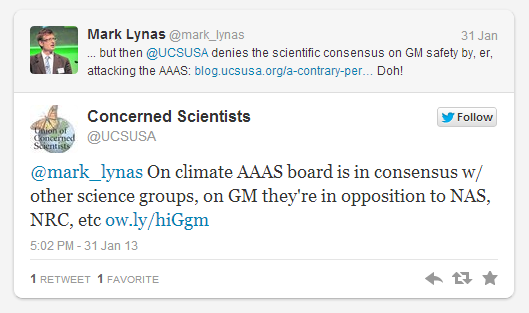

| Visitors Now: | |
| Total Visits: | |
| Total Stories: |

| Story Views | |
| Now: | |
| Last Hour: | |
| Last 24 Hours: | |
| Total: | |
Mark and Nina Fedoroff, have a civilsed chat about GMOs
Tuesday, February 5, 2013 3:50
% of readers think this story is Fact. Add your two cents.
Dr. Nina Fedoroff is a leading geneticist and molecular biologist and a Distinguished Professor of Biosciences at the King Abdullah University of Science and Technology in Saudi Arabia, where she is establishing a new Centre for Desert Agriculture. She is also an Evan Pugh Professor at Penn State University. She has contributed to the development of modern techniques used to study and genetically modify plants. From August 2007 to July 2010, she served as the Science and Technology Adviser to the US Secretary of State and to the Administrator of the US Agency for International Development (USAID). Dr. Fedoroff is a member of the National Academy of Sciences and the European Academy of Sciences, and is also a 2006 National Medal of Science laureate, the highest scientific honour that can be bestowed by the United States government. She was AAAS President in 2012 and is currently Chair of the AAAS Board of Directors.
Questions (by Mark Lynas):
1. You have read my speech to the Oxford Farming Conference. While it has attracted a lot of worldwide attention and support, it has also been attacked by some who make great play of their scientific credentials but who do not seem to actually be active in the plant science/molecular biology field. Since you are highly distinguished in this area, and indeed one of the pioneers of the field of transgenics, is there anything you think I got wrong which should be highlighted?
Professor Fedoroff:
“But what about mixing genes between unrelated species? The fish and the tomato? Turns out viruses do that all the time, as do plants and insects and even us – it’s called gene flow.” (Mark Lynas speech to Oxford Farming Conference)
This is a bit of an exaggeration. There is more mixing between species through horizontal transfer (viruses and such) than we used to think happens, but it isn’t all that common. The real answer to the question is that genes are simply instructions for making a protein and they aren’t either “fishy” or “tomatoey.” The rules for making proteins are the same in all organisms, so if you express a gene in another species, it will do the same thing it did in the first place. So the fish gene for a protein that inhibits ice crystal formation would make the tomato a little more resistant to below-freezing temperature, but it won’t make the tomato fishy.
This is a relatively minor point. On balance, you got most of the most important issues and you got them right. I particularly enjoyed your assessment of the organic movement – a huge commercial hoax.
2. As 2012 President of the American Association for the Advancement of Science, and current Chair of the Board of Directors, you are in a good position to help laypeople understand what the real scientific consensus is on GMOs. For instance, the Union of Concerned Scientists (UCS – an environmental lobby group) attacked the AAAS board statement on GMO safety and yesterday in a tweet claimed that the AAAS statement was “in opposition” to the National Academy of Sciences, the NRC “etc”….
More @ Mark Lynas » Professor Nina Fedoroff, Chair of the AAAS board – Q&A on GMOs:
2013-02-05 03:45:39
Source: http://gmopundit.blogspot.com/2013/02/mark-and-nina-fedoroff-have-civilsed.html
Source:



